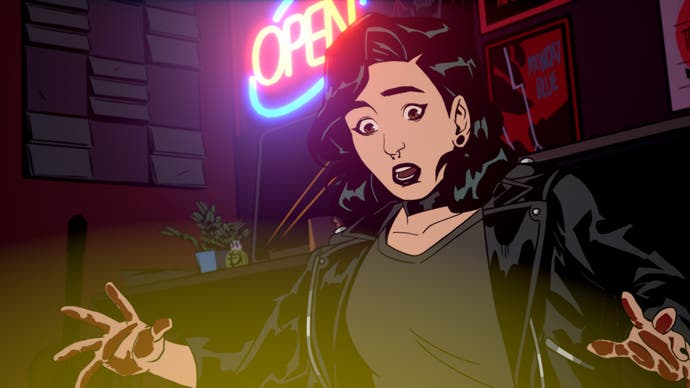Stray Gods: A Roleplaying Musical review - Greek melodrama fails to reach lofty expectations
Okla-Homer!
A roleplaying musical. How exciting! How intriguing! So many games have mixed genres with rhythm, now it's the turn to put narrative to melody: a musical as a video game.
And what a cast! What a production team! Stray Gods is written by David Gaider (Dragon Age) with music from Austin Wintory (Journey). It features most of the main cast of The Last of Us, including Troy Baker, Ashley Johnson, Laura Bailey and Merle Dandridge, as well as Erika Ishii, Rahul Kohli, and musical theatre star Anthony Rapp.
And it promises to please fans of both video games and musicals. I'm a fan of both of those things! Video games and musicals both as a form of storytelling, but now interactive, personalisable, immersive. Clearly I am quite excited.
For me, however, Stray Gods fails to live up to that lofty potential. Perhaps I expected too much. Perhaps these two forms of media are antithetical. The question I kept coming back to was: why is everyone singing? What does music actually add to the narrative?
The game itself gives a narrative reason for this. Our protagonist is Grace, a young woman struggling to find her place in the world like every other twentysomething with a brain. After sudden events, she has the power of a Muse thrust upon her, giving her the ability to evoke music from others. This isn't just people bursting into song, its Grace (and the player) manipulating others through song diegetically.
Yes, Grace is a Muse and is swept up into a modern day Greek tragedy of gods and melodrama. How very operatic. Her predecessor murdered, Grace must use her newfound ability to uncover the culprit through singing - plus a lot of flirting - and appease the Chorus of lead Idols (the top gods, led by the matriarchal Athena - Felicia Day). There's love and death and murder and manipulation and everyone's horny, but beneath all the heightened soap opera dramatics is a simple murder mystery with characters withholding information until conveniently revealed for plot purposes. By the end, I wasn't convinced Grace ever found her true purpose.
The Idols, meanwhile, are trying to find their own place in the modern world. After thousands of years they hide in the shadows or in plain sight, integrating into our society but slowly dying out as they attempt to pass their Eidolons (their spirit) into new mortal vessels to live for eternity. It's all very American Gods with some clichéd characterisation and choices. Of course Persephone, Queen of the Underworld (Mary Elizabeth McGlynn), runs a seedy nightclub literally called Underworld. Apollo, god of prophecy (Troy Baker), is a miserable surfer dude who's assisted by a nerdy hacker Oracle (Kimberly Brooks). Aphrodite (Merle Dandridge) is the classic diva. The voice of reason in all this is Grace's dorky best friend Freddie (Janina Gavankar), given quippy dialogue by Gaider to undercut and humanise the histrionics.
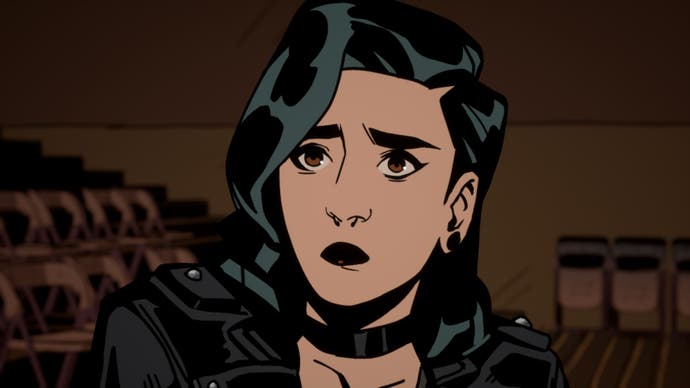
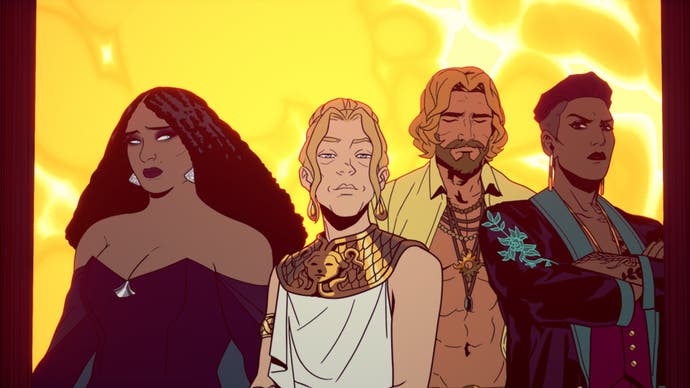
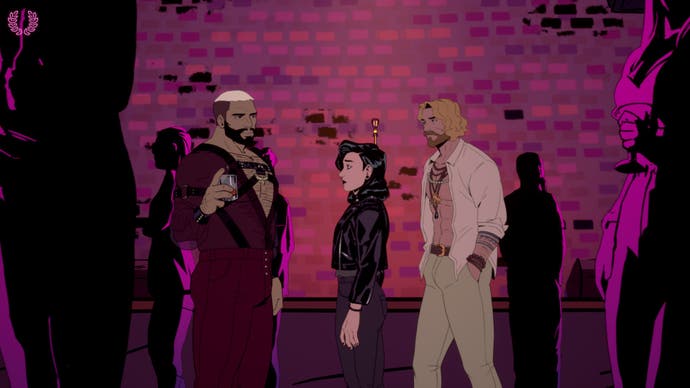
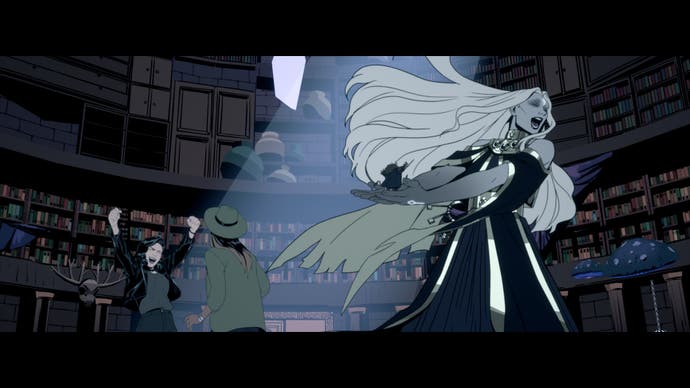
So how does this actually play? Stray Gods is a visual novel, with the player choosing dialogue options to mould the story and progress. At the start, players are given a choice of three options with which to roleplay: will Grace be charming, clever, or kickass? This in turn unlocks specific dialogue options as Grace questions the Idols. The problem is these choices have little bearing on the plot beyond added colour. A second playthrough had minor changes, but the story is fundamentally the same. As a roleplaying musical, Stray Gods is obviously not aiming to be a full RPG, but it does lack consequence. In dialogue, I never felt my choices had meaning, beyond choosing which horny god to partner up with.
In musical numbers, however, choices do matter more. It's here that Stray Gods is most innovative, but also where it fundamentally stumbles. As the band strikes up and the singing commences, you - as Grace - are able to choose dialogue options to shift the direction of the song and out-sing her godly opponents. Choose to be charming and Grace might sing a delicate, pleasing melody to win over her audience; choose the kickass option and she may rap in a sassy patter to make a more forthright point. It's like you're roleplaying as the orchestra conductor: commanding the shape of the music, but never playing directly or being in complete control. So while you manage the tone and feel of dialogue responses, you never quite know what you're going to get.
As the musical conversations unfold, the music constantly shifts with each new fragment of melody and dialogue. The way the music evolves to match the mood is clever and improvisatory, but also fleeting and ungraspable. There's little repetition or typical song structure. It's like an opera that's all recitative and no aria; constant musical dialogue but without pausing to ponder an emotion. By the end of my first playthrough, I could barely sing back to you a single melody.
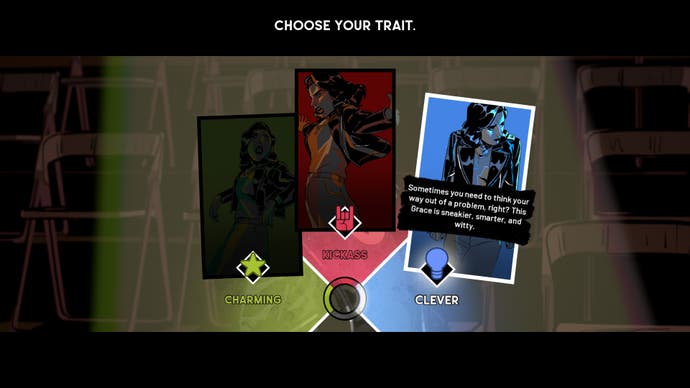
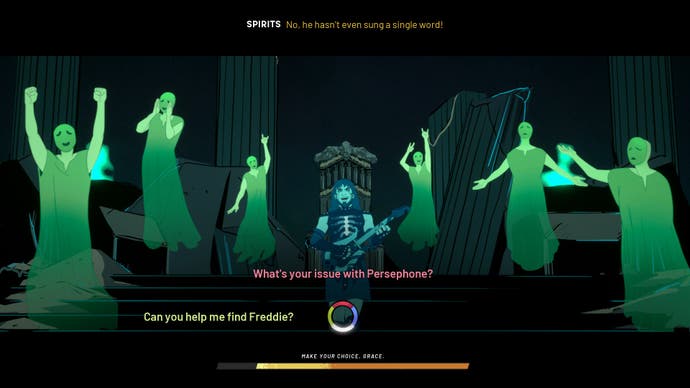
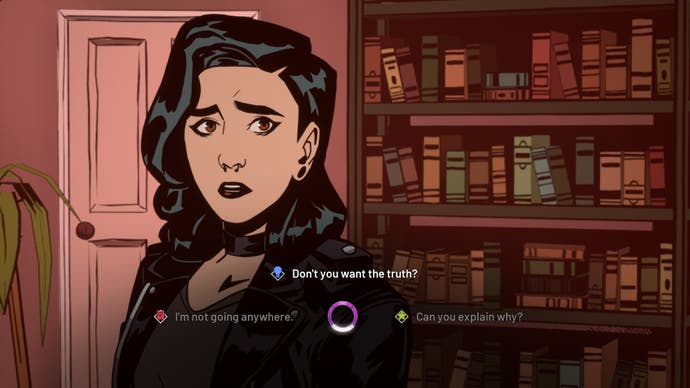
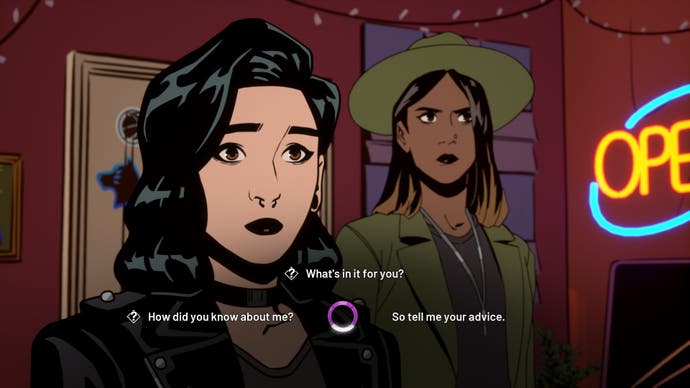
Frustratingly, there is some wonderful music here, once you take a beat to tune in. Seductive jazz, rock and electronica are inflected with classical orchestration and mandolin for a hint of the ancient. It's often downbeat and dour, but there are sometimes flashes of soulful melody and rich vocal harmonies. One specific climactic ballad is mournful and genuinely moving, while Anjali Bhimani's Medusa is given a fittingly sinewy, snakelike melody to sing above ominous deep bass. There's comedy too: I particularly enjoyed Grace's attempts at assisting a cockney Minotaur (Rahul Kohli) to profess his love to Hecate, goddess of witchcraft and magic (Allegra Clark). He sings of being a "bull in a china shop" and calls Theseus a "bellend", while she later wryly asks "do we have enough leather?" His terrible rhyming poetry may not sound overly tuneful, but that's the point.
Your experience could also be different to mine. Your choices could lead to different melodies, different instrumentation. That's fascinating! The narrative outcome, though, will likely be the same. Despite moments of joy or sadness or amusement, the songs of Stray Gods lack cohesion, rarely coming together into a satisfying listen. And that's the real issue at its heart: as a malleable 'choose-your-own-line' musical game it's missing the authorship and clear intent of composition. As a player and a listener, there's little melody to cling to.
What's also missing is a sense of theatricality. When we go to a musical, we want to experience live performances. We want to see the actors' faces, hear the humanity in their voices, watch the stagecraft of moving sets. Instead, Stray Gods falls flat. Its visuals present the story as a graphic novel in thick blacks and bold colours. It's stylistic, sure, but the (mostly) static images aren't enough to convey the emotions behind each performance. Characters stood with arms outstretched and mouths open wide is the default mode for emoting, but it lacks nuance.
As a result, we focus in on the vocal performances alone, for better or worse. The talented, well-known cast have perhaps been chosen for their acting ability rather than singing. They speak Gaider's smart dialogue with confident, characterful inflections. As the trickster Pan, Khary Payton absolutely chews up the virtual scenery with delicious relish, while as Eros god of sex, Abubakar Salim has the most handsome, clipped voice. The spoken sections are lively and energetic where the sung vocals lack dynamics.
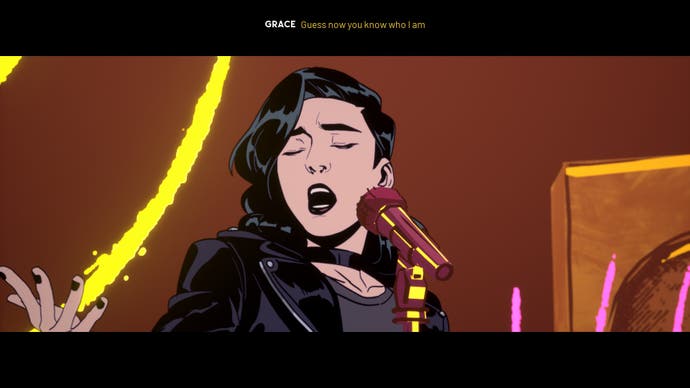
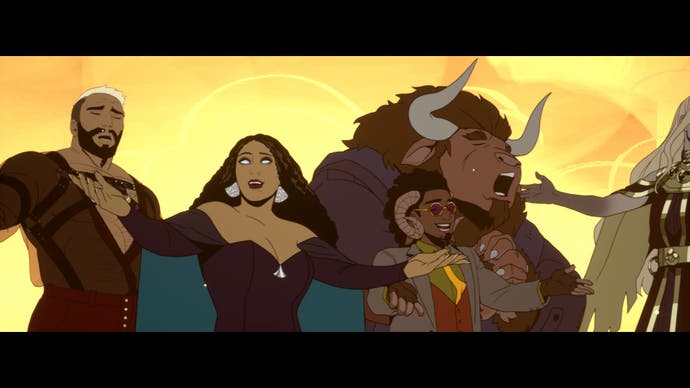
Some performances do impress. As Aphrodite, Dandridge is a commanding and sensual presence with an accomplished vocal able to deliver the character's depth of sadness. And Troy Baker's rough, breathy rock voice is well-suited to the emo Apollo. Bailey, meanwhile, has a pleasingly warm tone as Grace but lacks the musical dexterity to match the fluctuations of style each dialogue choice instigates.
So why was everyone singing? Well it's a musical, so of course they were. Yet Stray Gods presents singing as a game mechanic and misses the spark of what makes musicals (and games) so magical. We're neither making music nor impacting the narrative in meaningful ways; we're simply steering someone else's performance into a musical muddle. That lack of cohesion means the story never hits the lofty, emotional heights it's aiming for.
Stray Gods is a somewhat unsuccessful experiment then, but what it does achieve is a reflection on the power of music. In our world music has the power to move people; in this realm it has the power to move gods. I just wish it had a good tune.
